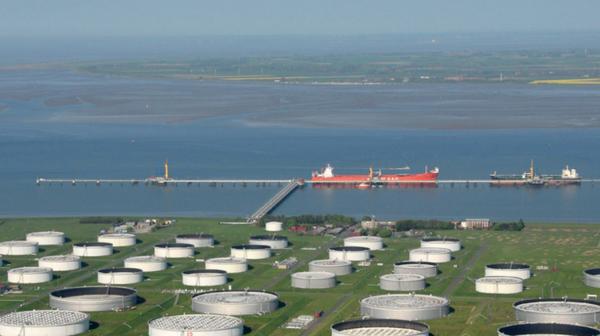BP plans to develop new hydrogen hub in Germany
U.K. oil supermajor BP plans to evaluate the feasibility of operating a hydrogen hub in Germany, from 2028, that can produce up to 130,000 mt/year of low-carbon hydrogen from green ammonia using an ammonia cracker.
 PHOTO: An aerial view of Wilhelmshaven Tank Terminal. BP
PHOTO: An aerial view of Wilhelmshaven Tank Terminal. BP
The company holds a stake in the Nord-West Oelleitung (NWO) terminal at Wilhelmshaven and plans to utilise its existing infrastructure for the hydrogen hub. It also intends to use existing oil and gas pipelines to transport hydrogen.
Green ammonia is produced by mixing nitrogen with hydrogen obtained from splitting water through electrolysis using renewable energy. Green ammonia will be shipped to Wilhelmshaven from BP’s worldwide green hydrogen projects. Then the cracker at Wilhelmshaven will convert it to green hydrogen by breaking the larger molecules into smaller ones which can be used directly as an energy source.
Green hydrogen produced in the project would be delivered to the Ruhr region and other demand centres in Germany.
Patrick Wendeler, chief executive of BP Europa SE, believes that the project in Wilhelmshaven “would help create greater energy independence for our German customers across a range of low carbon energy products” and “help Germany meet its energy transition goals.”
BP stated that there would be scope for future expansion at the hub as the market for alternative fuels grows.
BP’s senior vice president, hydrogen and CCS, Felipe Arbelaez, further revealed that the company is developing several “hydrogen and ammonia export locations in the Middle East, Africa and Australia, which could supply part of the European demand in the coming years.”
Apart from this project, BP has partnered with Danish power company Ørsted to develop an electrolyser plant in Lingen, Germany to produce renewable hydrogen. The company is also part of the GET H2 Nukleus project that aims to connect the production of green hydrogen with industrial consumers in Lower Saxony and North Rhine-Westphalia.
By Tuhin Roy
Please get in touch with comments or additional info to news@engine.online






